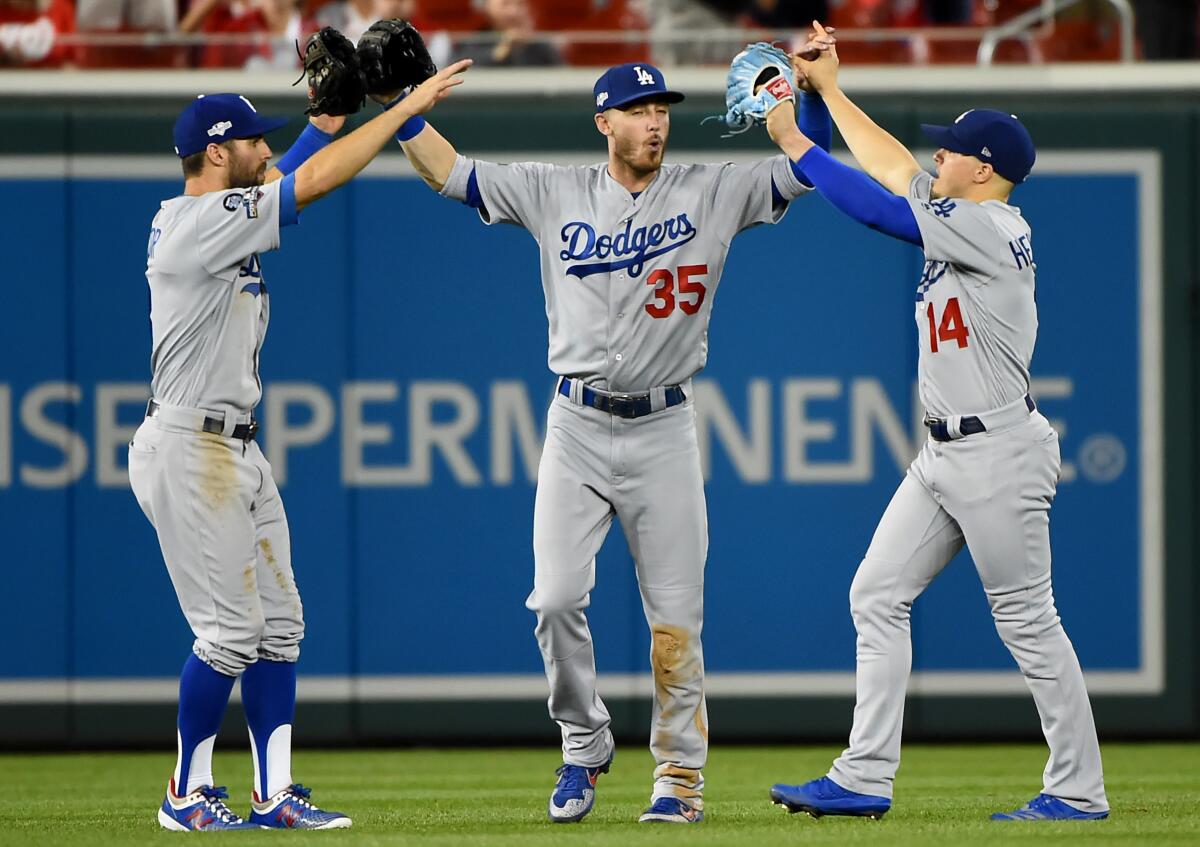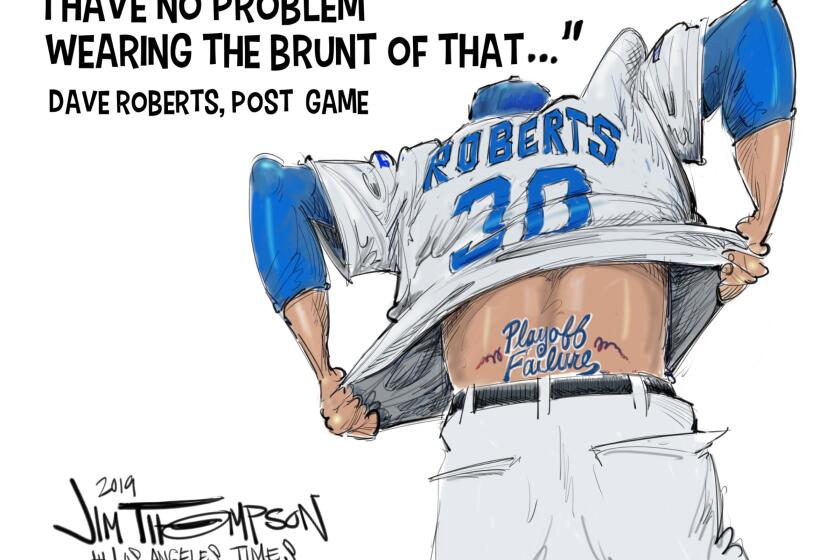Column: Dodgers must be bold in acquiring players necessary to win a World Series

- Share via
Dodger Stadium was a vortex of rage earlier this week. The boos directed at manager Dave Roberts had a particularly angry edge. The Dodgers were on the verge of another postseason elimination and the fans realized they had been taken for suckers again. They believed this season would deliver a long-awaited championship, only to discover the ending would be painfully familiar. Roberts became the symbol of their misplaced faith and they unleashed their fury on him.
The Dodgers have become legendary teases. Their seven consecutive playoff appearances comprise the third-longest streak of its kind in baseball history, but they don’t have a World Series title to show for it.
Consistency has a price. To ensure a place in the postseason every October, the Dodgers have refrained from taking the gambles necessary to win a championship.
Their thinking is that the playoffs are essentially a spin of the roulette wheel, which just so happens to be a convenient explanation for their failures. They insist they are more likely to win a World Series if they win their division annually rather than go all-in in any one season, which sounds like an excuse for avoiding tough decisions.
Bound to their future, the Dodgers won’t maximize their present. Seduced by the possibilities of tomorrow, they won’t sacrifice today.
As a result, they are now 31 years removed from the last time they hoisted the Commissioner’s Trophy.
Their organizational philosophy prevents them from making the kind of the deal the Chicago Cubs did in their championship season in 2016, ending a 108-year drought.
The price of that particular trade felt high then and it feels even more so today. In exchange for 42 1/3 innings of Aroldis Chapman, the Cubs traded seven years of Gleyber Torres.
Torres has since become an All-Star in each of his first two major league seasons. The 22-year-old middle infielder whacked 38 home runs this year and batted .417 for the New York Yankees in their recent sweep of the Minnesota Twins in an American League Division Series.
The Cubs missed the postseason entirely this year.
Such is the cost of October glory.
Not every wager is rewarded, as Cubs president of baseball operations Theo Epstein has learned. The year after they traded Torres, they traded Eloy Jimenez to the Chicago White Sox for starting pitcher Jose Quintana. The Cubs lost to the Dodgers in the NL Championship Series that year. Quintana has posted earned-run averages in the fours in each of the last two seasons while Jimenez blasted 31 home runs as a 22-year-old rookie this year.
The player the Dodgers pursued but failed to acquire at the trade deadline this year, Pittsburgh Pirates reliever Felipe Vazquez, was arrested last month on sexual-assault charges. In that instance, the Dodgers were fortunate the Pirates set a price on Vazquez they considered excessive.
With Andrew Friedman leading their baseball operations department, the Dodgers have refused to overpay in trades. At least intentionally. In Yordan Alvarez, they traded a player who looks like the Cuban Babe Ruth, but that was a function of them not knowing what they had. Their return in that 2016 trade with the Houston Astros was modest: reliever Josh Fields, whom they released this year. They acquired the most-coveted rental players on the market in Yu Darvish in 2017 and Manny Machado in 2018, but neither player cost them any top prospects.
The plan of gradually breaking in homegrown players has produced an MVP candidate in Cody Bellinger and a frontline starter in Walker Buehler. Corey Seager and Joc Pederson were All-Stars. Whether his future is as a starter or reliever, Julio Urias should develop into a key component of the pitching staff. The team’s National League Division Series roster against the Washington Nationals included four rookies: infielder Gavin Lux, catcher Will Smith, right-hander Dustin May, and utilityman Matt Beaty. And there are more players coming, as scouting director Billy Gasparino has continued stocking their minor league affiliates with talent.
Letters to the Los Angeles Times sports editor
But what did not trading any of these players cost the Dodgers? Maybe there wasn’t a destiny-altering trade to be made this year. But what about the year before that? Or the year before that?
In 2017, while the Dodgers acquired the reasonably priced Darvish, the Astros traded three of their top 10 prospects and absorbed more than $60 million in future salary commitments to acquire Justin Verlander. You know how that turned out.
Before the start of the 2018 season, the Astros struck again, sending four players to the Pittsburgh Pirates for Gerrit Cole. The guess here is the Dodgers would still be playing right now if he were a part of their rotation.
It’s important to remember that Verlander appeared to be in decline when he was acquired by the Astros and Cole was coming off a down year. There is as much art involved in the process as there is science, which only adds to the uncertainty.
The Dodgers have remained risk-averse, not only on the trade market, but also in free agency. They don’t want the kind of salary commitments that could hamstring the team in the future. Friedman’s most expensive outside free agent was outfielder A.J. Pollock, who signed a four-year, $55-million contract before this season.
The choice by the Dodgers to play it safe shouldn’t be a surprise, considering who runs the organization. If they are the Buffalo Bills of baseball, team president Stan Kasten is Bill. Kasten was the president of the Atlanta Braves when they won the first 12 of their record 14 consecutive division championships. They won only one World Series in that period.
Before the start of this season, Kasten defended the team’s lack of spending over the winter. Kasten’s dismissed concerns over the roster as “anecdotal,” pointing to how the Dodgers were on track to lead baseball in attendance again. If fans were still purchasing tickets, he surmised, they must be content with the product on the field.
But this mistaking of loyalty for satisfaction could have consequences. Fans will tolerate only so much disappointment. Home attendance for the Braves peaked at 3.46 million fans in 1997, two years after they won the World Series. They drew 3.23 million fans in 2000, but their attendance has been less than 3 million every season since.
A record 3.97 million fans visited Dodger Stadium this year, but attracting an audience to a first-round playoff series required extreme measures. Fans who attended Game 1 of the NL Division Series against the Washington Nationals received a free Cody Bellinger bobblehead doll. Ticket prices for that game were discounted, as well as for Game 2. Tickets for Game 5 were available on the Dodgers website the day of the game.
Skepticism about the team’s prospects figures to increase with every successive October failure. Only winning a World Series can reverse that. But to win, the Dodgers will have to do something new. They will have to be bold.
More to Read
Are you a true-blue fan?
Get our Dodgers Dugout newsletter for insights, news and much more.
You may occasionally receive promotional content from the Los Angeles Times.










